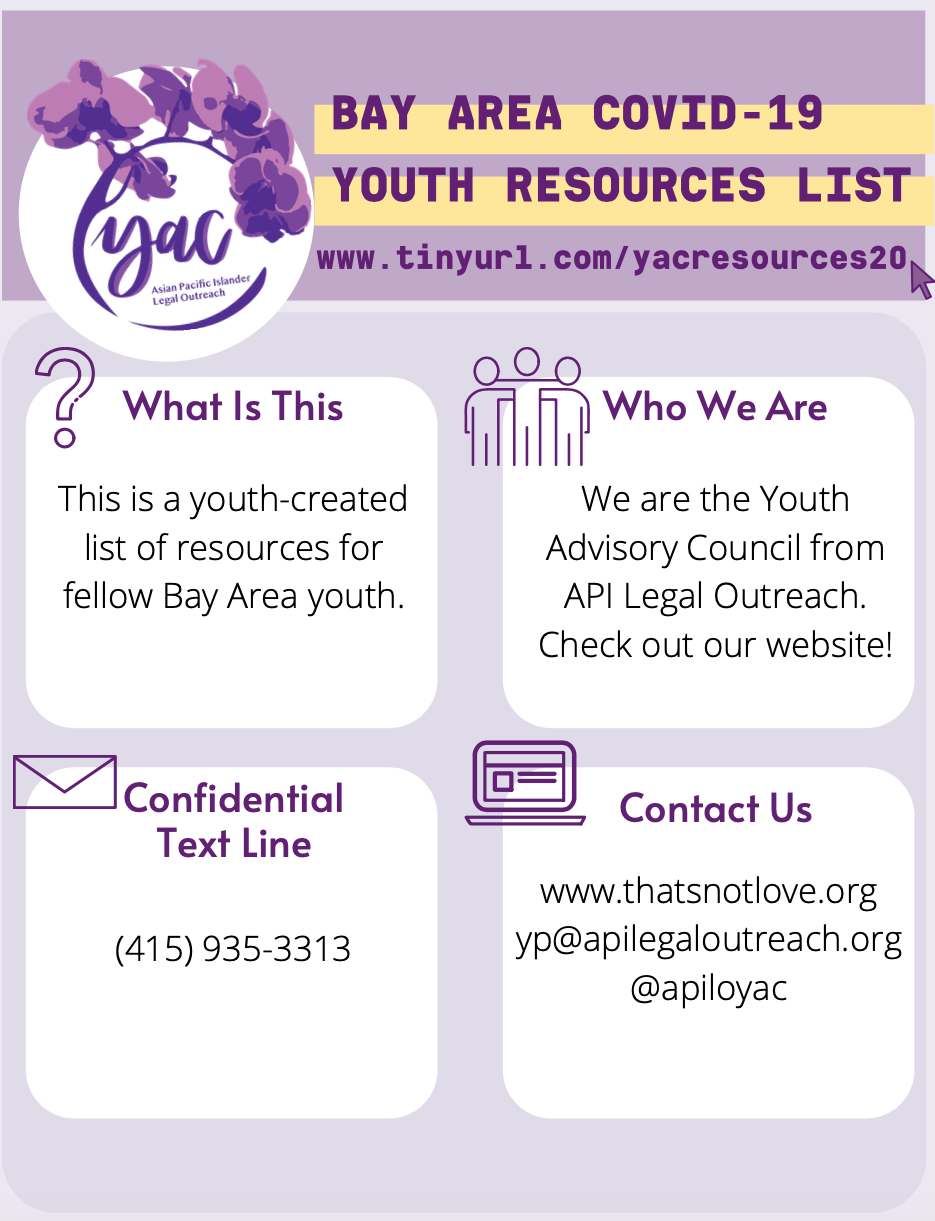COVID-19 RESOURCES
Coping with a global pandemic together as a community.APILO is open by appointment only and staff are working to serve all clients who call us. If you have questions about how the Pandemic has affected your legal rights, including the changes to evictions, please give us a call.
PLEASE CALL US at (415) 567-6255 or (510) 251-2846
We have attorneys and staff who speak English, Spanish, Chinese, Tagalog, Japanese, Vietnamese and Korean. The information communicated below is changing quickly; our staff is ready to help you, in your language, to navigate these trying times with care and expertise.
Hate Crimes | Elder Abuse and Scams | Domestic Violence | Immigration | Child Custody | Housing | Tax Filing | Non-profit + Small Business | Youth | Social Services And Volunteer |
HATE CRIMES
In case you missed this event, here is the video recording.
API Legal Outreach has seen a rise in Anti-Asian racism since the outbreak of COVID-19. It is important that we document these incidents in order to advocate for interventions and policies from an API and community-centered framework. If you have experienced a hate incident since the COVID-19 outbreak, please report it here so it can be tracked by the STOP AAPI Hate Reporting Center. The incident report only takes a few minutes and is available in English, Vietnamese, Chinese, Khmer, Korean, Japanese, and Thai.
Hate Crimes | Elder Abuse and Scams | Domestic Violence | Immigration | Child Custody | Housing | Tax Filing | Non-profit + Small Business | Youth | Social Services And Volunteer |
Avoiding Scams
There has been a rise in recent scams relating to stimulus checks, COVID-19, and the census, and seniors are especially vulnerable. Please be careful about disclosing personal information to anyone, and contact the APILO office for any assistance relating to scams.
Stimulus Payment Scams
Scammers have been using phone, text, and email messages to target SSI (Supplemental Security Income) recipients and steal their stimulus checks. In these messages, the scammer, pretending to be an official from a government entity, asks the victim for their bank account number, claiming that it is for the purpose of directly depositing the stimulus check. Scammers then use the victim’s bank account information to apply for and receive the victim’s stimulus payment.
Tips for Avoiding Stimulus Payment Scams
There are no fees or charges associated with the stimulus check. The government will never ask you to pay anything up front to receive your stimulus payment
The government will NOT call you to ask for your Social Security number, bank account, or credit card number. Do NOT disclose this type of personal information.
Report any scams to:
- Local police department
- Federal Trade Commission at www.ftc.gov/complaint
- Contact the APILO office for assistance relating to scams
If you want to receive your COVID-19 stimulus payment via direct deposit, you should apply using the official IRS website at https://www.irs.gov/coronavirus/economic-impact-payments
COVID-19 and Census Scams
Scammers have also contacted people by phone, text, email, or in person pretending to be the following:
- Public health officials, such as from the Centers for Disease Control (CDC) or San Francisco Department of Public Health (SFDPH)
- They may ask to enter residences to conduct inspections, OR:
- Claim to provide a cure or vaccination for COVID-19.
- Census workers
Tips for Avoiding Census Scams
Ask for proper identification before speaking to people who claim to be involved with these parties. Do NOT give money or any personal information, such as your social security number, bank account, or credit card information. Also, there are currently NO proven cures, treatments, or vaccinations for COVID-19.
Call 911 to report any scammers who attempt to contact you in person, and contact our office for assistance.
Hate Crimes | Elder Abuse and Scams | Domestic Violence | Immigration | Child Custody | Housing | Tax Filing | Non-profit + Small Business | Youth | Social Services And Volunteer |
VAWA Protection
What is the Violence Against Women Act (VAWA) in federal public housing?
1. It is a protection for survivors of domestic violence (which includes felony or misdemeanor crimes of violence committed by an abuser who is cohabitating with the victim), dating violence, sexual assault, or stalking. This will also cover the survivor’s immediate family members and other household members (The household members do not have to be related to the survivor and the survivor does not have to be married or living with the perpetrator.).
2. Rights VAWA offers: A survivor cannot be denied housing, and a survivor cannot be evicted or lose federal rental assistance. The exception to evict a tenant under VAWA is if the lease violation is not based on acts of violence or the PHA/owner can demonstrate an actual/imminent threat to other tenants (Threat is defined as a physical danger that is real, and would occur within an imminent time frame, and could result in death or serious bodily harm.).
3. VAWA is covered under the eviction moratorium due to COVID-19, along with most federally assisted rental housing programs.
How do I show that I am a survivor of a violent act?
1. Talk with your housing provider and complete a self-certification form provided by the housing authority. You will have to disclose the name of your abuser, the abuser’s relationship to you, and a description of the violence. Form HUD-5382 can be found here: https://www.hud.gov/program_offices/administration/hudclips/forms/hud5a
If you do not have access to the internet, or a computer, please call our office at (415) 567-6255, or a local legal aid agency.
2. You can also provide a letter signed by a victim service, medical/mental health professional, or an attorney. You will also have to sign this letter.
3. You can also provide a police report, court record, or an administrative record.
What if I am living with my abuser?
1. Alert the Housing Authority or your landlord, and they may evict the abuser, and allow you and the other members of your household to stay.
2. If the abuser is the one with the eligibility, then you, or another member of the household, have a right to prove that you are eligible for the housing. If you cannot, then you must be given a reasonable time to show that you qualify for another federal housing program or to find new housing.
3. If you have a Section 8 voucher, then you may leave the unit and keep your voucher, even if your lease is not over.
What if I am not protected under VAWA?
Contact a legal aid organization, an attorney, domestic violence agency, or a fair housing agency to see if you qualify.
During COVID-19, create a safety plan and practice self-care.
- Take the time to be mindful of washing your hands regularly, hygiene practices, etc.
- Reach out to others for help. Even if you wish to be alone, stay connected online or over the phone with your friends and families. Please call our organization for help, and also the National Domestic Violence Hotline at 1-800-799-7233.
- See Domestic Violence Restraining Orders
DOMESTIC VIOLENCE RESTRAINING ORDERS
What is a Domestic Violence Restraining Order?
It is a court order that can help protect people who have been abused or threatened with abuse.
What is abuse?
1. Physical
Hitting, punching, kicking, slapping, strangling, smothering, using or threatening to use weapons, shoving, interrupting your sleep, throwing things, destroying property, and denying medical treatment.
2. Sexual
Physically forcing sex, making you feel fearful about saying no to sex, forcing sex with other partners, forcing you to participate in demeaning or degrading sexual acts, violence or name calling during sex, and denying contraception or protection from sexually transmitted diseases.
3. Verbal
Calling you derogatory names, insulting, and threatening to hurt you.
4. Emotional
Constant put downs or criticisms, name calling, belittling one’s abilities.
5. Psychological
Causing fear by intimidation, “crazy making”, minimizing the abuse or blaming you for their behavior, threatening and making you feel fearful, isolating you from family and friends, excessive jealously, accusing you of having affairs, humiliating you, watching where you go and who you talk to, tracking your online activity, and playing “mind games” to make you doubt your sanity (gaslighting).
6. Financial
Giving you an allowance, not letting you have your own money, hiding family assets, running up debt, interfering with your job or ability to get a job, and ruining your credit.
7. Stalking
Physically following where you go or cyberstalking you.
8. Cultural and Identity Abuse
Using your race, class, age, immigration status, religion, size, physical ability, language, and/or ethnicity against you in some way.
Do I qualify for a restraining order?
You and the person you want to restrain must be:
- Married or registered domestic partners
- Divorced or separated
- Dating or used to date
- Living together or used to live together
- Parents together of a child, OR
- Closely related (parent, child, brother, sister, grandmother, grandfather, in-law).
How will a restraining order help me?
The court can order the restrained person to:
- Not contact or go near you, your children other relatives, or others who live with you
- Not have any guns or ammunition
- Move out of your house
- Obey child custody and visitation orders
- Pay child support
- Pay spousal support
- Obey orders about property
How do I apply for a domestic violence restraining order?
Forms to file DVRO can be found at: https://www.courts.ca.gov/forms.htm?filter=DV
Here are resources if you need assistance on filing in Alameda and San Francisco counties:
Alameda County
1) Self-Help Center Monday – Thursday 1PM – 4PM at (510) 272-1393
2) Family Violence Law Center at (510) 208-0220
3) Bay Area Legal Aid at (888) 330-1940
San Francisco County
1) API Legal Outreach at (415) 567-6255
2) Bay Area Legal Aid at (888) 330-1940
3) Cooperative Restraining Order Clinic at (415) 255-0165
Should I be concerned about my immigration status in filing for a restraining order?
CREATING A DOMESTIC VIOLENCE SAFETY PLAN
How do I create a safety plan?
1. Identify safe areas of the home where there are no weapons and there are ways to escape (window or door).
2. Have a phone accessible at all times and know what numbers to call for help.
3. Let trusted friends and neighbors know of your situation and develop a plan and visual signal for when you need help.
4. Teach your children how to get help but do not get them involved in the violence between you and your partner.
How do I practice self care?
-
- Journaling
- Reading
- Picking up a hobby
- Talking to a friend
- Listening to music
- Meditating
- Praying
- Baking/Cooking
- Practice breathing exercises
Who can help me?
1. National Domestic Violence Hotline at (800) 799-7233 or (800) 799-7233 for TTY, or text LOVEIS to 22522.
2. W.O.M.A.N., Inc. for peer counseling, safety planning, and referrals for needed resources, 24-hour support line at (877) 384-3578
3. Family Violence Law Center Mobile Response Team for crisis intervention, safety planning, and referrals to counseling at (800) 947-8301
4. Bay Area Women Against Rape at (510) 845-7273
BENEFITS AND ASSISTANCE FOR IMMIGRANTS
Are immigrants eligible to receive payments/rebates under the CARES Act?
1. Individual taxpayers and couples filing jointly who have both been issued social security numbers that are valid for employment are eligible for the rebate. Many DACA recipients, TPS recipients, asylees and refugees may qualify. Unfortunately, this SSN requirement excludes many immigrants and mixed-status families. Also, those who are not U.S. citizens or Legal Permanent Residents must reside primarily in the United States.
2. Undocumented immigrants who do not have social security numbers are not eligible for these payments. Immigrants who use an ITIN for their taxes are also not eligible.
3. There is no way to apply for this relief, the payments are done automatically and are calculated based on your most recent tax return.
If you have questions, please call our office at (415) 567-6255 or (510) 251-2846 for information! For more detailed information, you can also see: https://www.nilc.org/issues/economic-support/impact-of-covid19-relief-bills-on-immigrant-communities/
Are immigrants eligible to receive unemployment (UI) benefits?
Yes, if you have valid work authorization. Many DACA recipients, TPS recipients, asylum applicants, asylees, and refugees have valid work authorization and can receive unemployment benefits.
APILO is here to help apply for unemployment benefits. Call our office today for assistance or questions.
For more information on public benefits and resources available to immigrants in California, see the Guide for Immigrant Californians: https://covid19.ca.gov/guide-immigrant-californians/
Are undocumented immigrants eligible to receive any stimulus payments or other relief?
On April 15th, Governor Newsom announced one-time disaster relief assistance for undocumented Californians impacted by COVID-19, who are ineligible for most other forms of pandemic assistance, including direct assistance under the CARES Act and unemployment insurance.
According to the state’s website, “eligible Californians may receive one-time COVID-19 disaster relief assistance at a value of $500. A limit of two adults per household can receive this assistance (maximum assistance of $1,000 per household).”
Undocumented immigrants in the Bay Area can now apply for this relief through Catholic Charities. Call them at 415-324-1011 from 8 AM – 8 PM, Mondays through Saturdays. See https://www.catholiccharitiessf.org/ for the latest updates, they are experiencing high call volume and it may be difficult to get through.
Undocumented immigrants may also be eligible for State Disability Insurance (SDI) and Paid Family Leave.
For more information on public benefits and resources available to immigrants in California, see the Guide for Immigrant Californians: https://covid19.ca.gov/guide-immigrant-californians/
APILO is here to help immigrants and those without legal status apply for COVID-19 related benefits. Call our office today for assistance or questions.
PUBLIC CHARGE
If I use Medi-Cal (federally funded health insurance) to pay for my COVID-19 testing, treatment or preventative care, will I be considered a public charge under the new rules (hurting my ability to get a green card)?
NO. If you get COVID-19 testing, treatment or preventative care, that alone will not be considered as a factor to determine if you are a public charge.
I have been laid off and my family needs help. If I apply for other benefits because of COVID-19, will I be considered a public charge for immigration purposes?
- It depends on the benefits you apply for and for how long you will be receiving them. For example, applying for unemployment benefits and receiving food from places like the SF/Marin Food Bank Salvation Army, St. Anthony’s, Glide or other food banks/pantries will not be considered for public charge determinations.
- Public charge may not apply to you or the benefits you use may not be one of the benefits defining public charge. NOT all immigrants are subject to a public charge determination.
- If you are not sure, please consult an experienced immigration lawyer to determine if public charge applies to you.
Where can I go for more information on public charge?
COVID-19 POLICIES FOR USCIS, IMMIGRATION COURT AND ICE
What should I do if I have a USCIS interview or appointment scheduled?
USCIS plans to reopen on or after June 4, unless public closures are extended further. USCIS will reschedule your interview or appointment if it was scheduled during its closure.
This includes Asylum Office interviews, Naturalization/Citizenship interviews, Oath Ceremonies, Biometrics appointments and interviews for adjustment of status (green card) applications.
You can check on the status of USCIS on their website: https://www.uscis.gov/about-us/uscis-response-covid-19
If you do enter a USCIS office or facility, you are now required to wear a mask.
What should I do if I have an Immigration Court hearing scheduled?
The San Francisco Immigration Court is currently postponing all non-detained hearings scheduled through July 17, 2020. If your hearing is scheduled on or before this date, the Court will reschedule your hearing.
You can also call the Court at 1-800-898-7180 to check on the scheduling of your hearing date. The automatic system is available in English and Spanish, and all you need is your A number. Continue to call to check on your hearing date.
You can check on the Immigration Court’s status on their website: https://www.justice.gov/eoir/eoir-operational-status-during-coronavirus-pandemic
What should I do if I have an appointment scheduled to check in with ICE?
ICE has posted guidance and FAQs on their current check-in policy here: https://www.ice.gov/coronavirus
ICE has temporarily suspended the requirement to report in-person for office visits, and home visits have been temporarily suspended as well until further notice. ICE will continue to use telephonic and electronic reporting between participants and case specialists. If you have a scheduled ICE check-in, contact the local ICE field office by phone for further instructions. If you missed your scheduled ICE check-in, you need to ensure that you make contact with ICE. If they do not answer, leave a message with your name, A-number, and phone number. ICE will contact you with updated information on how to proceed with your scheduled check-in.
To contact the San Francisco Field Office: Phone: (415) 844-5512, Email: SanFrancisco.Outreach@ice.dhs.gov
What if I received a Request for Evidence (RFE) or Notice of Intent to Deny (NOID) on my USCIS application?
On March 27, 2020, USCIS announced that it will allow an automatic 60-day extension for all Requests for Evidence (RFEs) and Notices of Intent to Deny (NOIDs), if the RFE or NOID is dated between March 1 and May 1, 2020. A similar announcement on March 30, 2020 clarifies that the automatic 60-day extension also applies to responses to Notices of Intent to Revoke (NOIRs) and Notices of Intent to Terminate (NOITs) regional investment centers, as well as I-290B Notices of Appeal or Motion to the Administrative Appeals Office.
In addition, the San Jose and San Francisco Field Offices in California announced a local policy of automatically extending RFE deadlines for 30 days, for any RFEs due during the office closure.
Can I still file my immigration application or petition?
Even though USCIS and Immigration Courts are postponing appointments and hearings, and President Trump issued an executive order to temporarily pause certain forms of immigration, many applications are still being accepted and processed.
USCIS is still accepting and processing applications, including for naturalization, adjustment of status (for legal permanent residence), DACA renewal, and employment authorization. Trump’s recent executive order may have an impact on some applications. We are continuing to monitor this development.
Immigration Courts are still accepting filings. In San Francisco, the filing window at 100 Montgomery Street, 8th Floor, is open during regular business hours for filings (please wear your mask in common areas). Filings may also be sent via email: https://www.justice.gov/eoir/filing-email
Does APILO handle DACA Renewals?
Yes! Call our office today to ask about getting assistance with your DACA renewal.
Hate Crimes | Elder Abuse and Scams | Domestic Violence | Immigration | Child Custody | Housing |Tax Filing | Non-profit + Small Business | Youth | Social Services And Volunteer |
INFORMATION FOR PARENTS SHARING CUSTODY DURING THE COVID-19 PANDEMIC
The Courts in the Bay Area Counties have provided different tips for co-parenting during COVID-19 but they have shared the following common recommendations for all parties to follow:
- COVID-19 is not an excuse to deny or withhold parenting time. For example, the San Mateo Superior Court specifically states that “unless otherwise ordered by the court, parents are considered fit to care for their children and make decisions regarding the day-to-day aspects of parenting while the children are in their care.” For more information, see here.
- All parents should comply with all CDC, local, state and federal guidelines to minimize and reduce the risk of being exposed to the COVID-19 virus.
- Any type of travel should be restricted to essential activities.
- Both parties should maintain an open and transparent communication channel. This means that both parties must be honest about any precautionary measures that they are taking while staying at home.
- Try to be flexible and understanding with one another. There are very challenging times for everyone. Unexpected events or incidents may occur that could disrupt the previously agreed sharing time. The American Academy of Matrimonial Lawyers (AAML) reminds all parents that “adversity can become an opportunity for parents to come together and focus on what is best for the child. It’s important for every child to know and remember that both parent did everything they could to explain what was happening and to keep their child safe.” For more information, click here.
Hate Crimes | Elder Abuse and Scams | Domestic Violence | Immigration | Child Custody | Housing | Tax Filing | Non-profit + Small Business | Youth | Social Services And Volunteer |
APILO is here to assist tenants and homeowners from losing their homes during the COVID-19 pandemic.
San Francisco and Oakland remain among the most expensive cities in the country in terms of housing costs. Both cities are constantly in the midst of a housing crisis: the demand for housing greatly exceeds the available supply. The COVID-19 pandemic further worsens the effects of the on-going crisis, as the consequences of displacement are now even more grave than before. All members of the community experience financial hardship, and an uncertain future, especially the most vulnerable members and families who are not able to shelter in place. The ability to maintain secure housing has become a greater challenge during the pandemic.
Tenants Rights During the COVID-19 Pandemic
Tenants are encouraged to contact API Legal Outreach for detailed advice on their specific situation because special protections have been invoked for the duration of the COVID-19 emergency. Please contact us immediately if: 1) You feel at risk of losing your home; 2) You are told by your landlord to sign any documents; and/or 3) You receive any documents relating to your housing.
Protection for San Francisco Residents:
- Eviction moratorium
- Residential evictions are banned for at least two months after the Mayor’s current order which expires on June 30, 2020, except for cases involving violence (or threats of violence) and/or health and safety.
- San Francisco tenants’ rent payment obligations may be temporarily suspended pursuant to these guidelines:
- Give notice of inability to pay rent to their landlord within 30 days of rent being due for every month the tenant is unable to pay;
- Provide written proof of financial impact within one week of the tenant’s first notice to the landlord (a letter detailing the actual impact of the pandemic on the tenant’s ability to pay rent will suffice); and
- Work in good faith to do a six-month payment plan process for each rent payment missed due until at least six months after July 22, 2020.
Protection for Oakland Residents
- The Alameda County Board of Supervisors has enacted an emergency order that stopped all evictions throughout the county- except those concerning health and safety. This will remain in effect until 30 days after the Emergency order ends.
- The moratorium prohibits landlords from assessing late fees and significantly limits rent increases by barring increases beyond 3.5%.
- A property owner cannot evict a tenant for failure to pay rent if the rent was unpaid due to substantial loss of income or an increase in expenses resulting from the COVID-19 pandemic. However, rent that has not been paid is still due.
California and Federal Protections for Homeowners Facing Foreclosure During COVID-19
| FORECLOSURE UPDATES FOR HOMEOWNERS | FORECLOSURE UPDATES FOR TENANTS |
| California Govt. - EXECUTIVE ORDER N-28-20: Foreclosures are suspended through July 28, 2020, unless extended. | California Law: month-to-month lease/periodic tenancy at the time the property is sold in foreclosure shall be given 90 days’ written termination notice. |
|
Federal Govt. - CARES Act, Relief from Foreclosure: Homeowners with federally-backed mortgage loans affected by COVID-19 can request (in writing) their servicer for forbearance from mortgage payments for up to 180 days, & then timely request (written) the servicer for additional forbearance for up to another 180 days. The covered period appears to be during the emergency or until December 31, 2020, whichever is earlier. |
California Law: fixed-term residential lease entered into before transfer of title at the foreclosure sale shall have the right to possession until the end of the lease term, and all rights and obligations under the lease shall survive foreclosure; except, tenancy may be terminated upon 90 days’ written notice if, including, the purchaser/successor in interest will occupy the housing unit as primary residence. |
|
Calif. Courts - Emergency Rules of California Rules of Court, April 6, 2020, Rule No. 2: suspends judicial foreclosures. The emergency rule remains in effect until 90 days after the pandemic state of emergency is lifted or the judicial authorities otherwise suspends the rule. |
How can tenants find out if the place they rent is in foreclosure? Tenants may review their county recorder’s office’s website (online records of NOD &/or NTS) based on the owner’s full name. Also, tenants may record, in their county recorder’s office, a Request for Notice, for notification of foreclosure proceedings such as copy of the Notice of Default (NOD) and Notice of Trustee’s Sale (NTS). |
|
Please contact APILO regarding:
|
California Law - Tenant security deposit: Upon termination of the prior landlord’s interest in the premises, the prior landlord/agent, within a reasonable time, shall: (1) Transfer remaining portion of security deposit, if after any lawful deduction, to new landlord, and provide proper personal or delivery notice to tenant, or (2) Return remaining portion of security, if after any lawful deduction, to the tenant, with proper accounting. Alternatively, if prior landlord/agent is noncompliant with above (#1 or 2), then new landlord shall be jointly and severally liable with prior landlord for repayment of tenant’s proper security deposit. |
| *** Please note – all information subject to change, without notice, usually depending on govt./agency/authority modification/revision. | *** Please note – all information subject to change, without notice, usually depending on govt./agency/authority modification/revision. |
Tell me more about efforts in the community to strengthen protections for those at risk of displacement.
Organizations are advocating to #canceldebt, demanding any mortgage relief, rent relief for tenants, suspending all utility shut-off and reinstate utilities for those who have already lost services, and ending all homeless encampment sweeps and house people so they can safely shelter in place.
*This is not tax advice. Ask a tax professional if you have any questions about your taxes.*
Where can I get help to file my 2018-19 tax return?
East Bay Asian Local Development Corporation (EBALDC) hosts the Volunteer Income Tax Assistance (VITA) Project providing free tax preparation for low-income individuals and families. EBALDC has closed the three sites (Asian Resource Center, LCC, and Laney College) and has temporarily redirected their services to 1825 San Pablo Suite 200, Oakland, CA due to COVID-10. Appointment is required and can be scheduled by calling (510) 693-3043 or online here in English and in Chinese, Spanish, Vietnamese and Mongolian. All services are drop-off only due to the shelter-in-place orders.
*This is not tax advice. Ask a tax professional if you have any questions about your taxes.*
When is the new deadline to file for taxes?
Due to COVID-19, the Treasury Department and the Internal Revenue Service extended the filing deadline for tax returns from April 15 to July 15, 2020. In California, taxpayers will have until July 15, 2020 to file and pay income taxes
*This is not tax advice. Ask a tax professional if you have any questions about your taxes.*
Hate Crimes | Elder Abuse and Scams | Domestic Violence | Immigration | Child Custody | Housing | Tax Filing | Non-profit + Small Business | Youth | Social Services And Volunteer |
NON-PROFIT + SMALL BUSINESSES - WE'RE HERE TO SUPPORT YOU!
APILO has attorneys standing by to advise small businesses and non-profits on CARES Act and other financial support during these trying times.
- A second round $484 billion COVID-19 relief package for small businesses has been passed (as of April 23, 2020). This includes $60 billion that will be dispersed to credit unions and smaller lenders in order to help businesses that do not use major financial institutions.
- Once the Small Business Administration (SBA) starts accepting applications once again, it is important to act quickly as the relief money is in high demand. Please have your financial documents ready.
- Senator Kamala Harris of California is calling for the SBA to ensure that small businesses owned by low-income communities of color receive a fair opportunity in security loans under fair lending laws.
- If you have any questions as to your eligibility and application processes for potential future PPP or EIDL loans, please call our office for assistance.
- Please know that conditions and requirements for eligibility for the CARES Act programs are constantly changing. Please call our office at (415) 567-6255 or (510) 251-2846 for more in-depth and up to date information.
What is APILO’s Youth Program and Youth Advisory Council doing?
In this time of COVID-19 and shelter-at-home, our youth populations experience this moment uniquely with their own set of barriers, challenges, and adjustments. APILO’s Youth Program has moved all programming online, and modified the Youth Advisory Council internship to be responsive to the youth needs of the current moment.
These are the steps we are taking:
Increasing outreach efforts (see strategy below)
Virtually checking in and meeting with Youth Advisory Council interns more frequently (3-4 times per week in breakout groups and as a large group)
Remaining available to the public through our confidential text line (415-935-3313) and email (yp@apilegaloutreach.org)
The Youth Advisory Council interns have been crucial to our outreach strategy at this time because of their proximity to the community and their intimate knowledge of youth needs right now. Our interns created a “Bay Area Youth COVID-19 Resource List” that includes youth-centered and trauma-informed resources for food, domestic violence, mental health, physical health, volunteering, virtual community spaces, and hobbies. Our YAC interns are promoting this crucial resource list through social media graphics, email PSA’s, schools, word of mouth, and on their YAC website/blog/instagram.
Link for “Bay Area Youth COVID-19 Resource List:” http://tinyurl.com/yacresources20
Youth Advisory Council Instagram with Educational and Outreach Materials: https://www.instagram.com/apiloyac/

PLEASE CALL US at (415) 567-6255 or (510) 251-2846
We have attorneys and staff who speak English, Spanish, Chinese, Tagalog, Japanese, Vietnamese and Korean available to answer your call during business hours, and will be checking messages left after-hours and on weekends. Please call us to learn more about the topics listed above, or to get legal advice in the numerous areas of law in which we specialize.







Hate Crimes | Elder Abuse and Scams | Domestic Violence | Immigration | Child Custody | Housing | Relief For Workers | Stimulus Check | Tax Filing | Non-profit + Small Business | Youth | Social Services And Volunteer |
I am in need of help and/or would like to volunteer in San Francisco. What opportunities are available and how can I sign up?
The following food programs help our community through this difficult time, and also some seek volunteers. Please see their :
Self-Help for the Elderly Food Delivery: email josephinem@selfhelpelderly.org or call at 415-606-8111 (including weekend) to volunteer.
I would like to help and/or volunteer in Oakland. What opportunities are available and how can I sign up?
The Oakland Resource Project allows you to search resources like food, shelter, clothing, counseling, and personal hygiene.